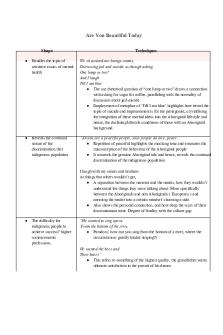LJ-wk1 - Take the Least Preferred Coworker Scale by Fiedler and find out if you are a PDF

| Title | LJ-wk1 - Take the Least Preferred Coworker Scale by Fiedler and find out if you are a |
|---|---|
| Author | Nelson Ngole |
| Course | Leadership (proctored course) |
| Institution | University of the People |
| Pages | 1 |
| File Size | 55.8 KB |
| File Type | |
| Total Downloads | 10 |
| Total Views | 141 |
Summary
Take the Least Preferred Coworker Scale by Fiedler and find out if you are a relationship-oriented or task-oriented leader. Note your scores and comment on your opinion about the validity of this test as well as possible leanings in your leadership development....
Description
Unit one of this course is titled ‘Introduction to leadership’. In the course of the lesson, we defined what leadership means in various ways. We then recognized and shared the antiquity of leadership, key leadership models and theories. Finally, we authenticated leadership capabilities with empirical scientific studies in-line with previous practices and feelings. The learning journal for this week demands that we take the test survey on Friedlers’ least preferred co-worker (LPC) scale to determine whether my leadership ability is inclined to relationship or task oriented. Before commenting on the scale's results, I believe it is necessary to define leadership and provide a synopsis of Fiedler's Contingency Theory of Leadership. Leadership is all about persuading others to achieve personal or organizational goals (Bauer & Erdogan, n.d, p266). The effectiveness of a leader is influenced by how well their leadership style fits the environment, according to Fiedler's Contingency Theory of Leadership. According to the concept, each of us has only one type of leadership, which can be measured using the Least Preferred Coworker (LPC) scale (EPM, n.d para 1). Two factors influence this theory: leadership style and situational favorableness. To be eligible to use the first element of this model, you must first determine your natural leadership style using Fiedler's developed scale known as the 'Least Preferred Co-worker (LPC)' (Bauer & Erdogan, n.d p274). A high LPC indicates a relationship-oriented leader, whereas a low LPC indicates a task-oriented leader. The second component of this model is situational favorability, which operates across three dimensions, including leader-subordinate relationships. (This metric indicates how much trust your team has in you. A higher level of trust increases the favorableness of the situation, whereas a lower level of trust decreases it.) Position power (your authority, or the ability to reward or punish your subordinates) determines this. As you might expect, having more power improves situational favorability.), and task structure (This component determines the number of tasks that must be completed. Are they precise and clear, or are they hazy? Whereas ambiguous tasks make the situation less favorable. Tasks that are concrete and explicit help to improve them.) After completing the LPC, I received a 70.This score is in the range of 65 to 72.It simply reveals that I am a hybrid of the two extremes. That is, I am capable of both relationship and taskoriented leadership. This score, in fact, reflects who I am with respect to the people I work with. As a leader, I am unprejudiced in my approach to working with all types of people. One of my techniques is to try to learn about people, empathize with them and sometimes put myself in their world to get to know their preferences. In the majority of cases, I have a breakthrough.
References
Bauer. T & Erdogan. B(n.d) Organizational Behaviour
Expert Program Management-EPM(n.d). Fiedler’s Contingency Theory of Leadership. https://expertprogrammanagement.com/2018/11/fiedler-contingency-theory/...
Similar Free PDFs

Least Preferred Coworker Scale
- 2 Pages

IF YOU ARE WHAT YOU EAT(1)
- 6 Pages

Catch me if you can - Grade: A-
- 3 Pages

you are what you buy
- 2 Pages

What would you do if
- 2 Pages

MBTI Test- Are You In The Grip?
- 5 Pages

Are you beautiful today
- 3 Pages
Popular Institutions
- Tinajero National High School - Annex
- Politeknik Caltex Riau
- Yokohama City University
- SGT University
- University of Al-Qadisiyah
- Divine Word College of Vigan
- Techniek College Rotterdam
- Universidade de Santiago
- Universiti Teknologi MARA Cawangan Johor Kampus Pasir Gudang
- Poltekkes Kemenkes Yogyakarta
- Baguio City National High School
- Colegio san marcos
- preparatoria uno
- Centro de Bachillerato Tecnológico Industrial y de Servicios No. 107
- Dalian Maritime University
- Quang Trung Secondary School
- Colegio Tecnológico en Informática
- Corporación Regional de Educación Superior
- Grupo CEDVA
- Dar Al Uloom University
- Centro de Estudios Preuniversitarios de la Universidad Nacional de Ingeniería
- 上智大学
- Aakash International School, Nuna Majara
- San Felipe Neri Catholic School
- Kang Chiao International School - New Taipei City
- Misamis Occidental National High School
- Institución Educativa Escuela Normal Juan Ladrilleros
- Kolehiyo ng Pantukan
- Batanes State College
- Instituto Continental
- Sekolah Menengah Kejuruan Kesehatan Kaltara (Tarakan)
- Colegio de La Inmaculada Concepcion - Cebu








